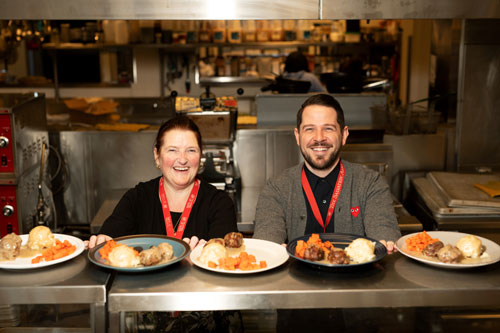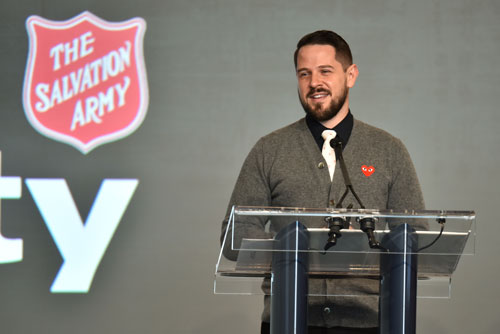Depressed and utterly alone, Tyler had spent the day making plans to commit suicide.
“That was the lowest moment of my life,” he says now.
 Tyler Weatherup with his direct supervisor, Cristina Schneiter, the residential services manager. “We met a few years ago when I was a support worker and she was a volunteer,” Tyler says. “I must have trained her well because now she’s my boss!”
Tyler Weatherup with his direct supervisor, Cristina Schneiter, the residential services manager. “We met a few years ago when I was a support worker and she was a volunteer,” Tyler says. “I must have trained her well because now she’s my boss!”
Tyler’s struggle with drugs and alcohol began in college. “At first, I was drinking on weekends, then during the week—eventually I stopped going to classes because I was hung over,” he says. “After my third year of college, I simply dropped out.”
At that point in his life, drinking was a way to escape from the emotional turmoil that was happening inside him. “I knew from a young age that I was gay, but I grew up in a conservative family so coming out and being truthful about my identity wasn’t a possibility,” Tyler says. “By the time I went to college, my sisters were getting into long-term relationships and I felt like I was missing out—that I would never have what they had. Alcohol drowned out those negative feelings.”
After Tyler dropped out of college, he moved in with his sister, who was also an addict.
“It goes to show just how clouded my judgment was then,” he says ruefully. “I still thought I could climb my way out of it, even though the reality was that I was unemployed, I had no money, I had tons of debt and I had no relationships—my sister was the only person who was willing to support me.”
A few months after he moved in with her, however, they were evicted. “I came home and the locks had been changed,” Tyler recalls. “The sheriff had removed everything from the apartment. I had nothing.”
Divine Timing
Tyler spent his first night of homelessness on the streets of Langley, B.C., walking all night so that he would stay awake. He went to the welfare office the next day and was referred to The Salvation Army’s Gateway of Hope shelter. Unfortunately, the Gateway was full that day, which is how Tyler ended up at the bottom of the staircase.
After that awful night, Tyler returned to the welfare office the following day. “I was thinking, maybe I can get 20 bucks and buy whatever I need to end my life,” he shares. “But there was a couple there who had seen me at the welfare office the day prior. They told me they were discharging from the Gateway of Hope that day, and said, ‘Maybe you can get our bed.’ I went back to the shelter with them and, sure enough, that’s how I got in. It was divine timing.”
 Tyler serves lunch at the Gateway of Hope with Suzanne Van’t Haaff, the food service manager
Tyler serves lunch at the Gateway of Hope with Suzanne Van’t Haaff, the food service manager
While Tyler stayed in the shelter for 30 days, the Gateway staff encouraged him to apply for the facility’s transitional housing, where he lived for the next two years. During that time, he took courses, learning essential life skills, and underwent counselling to improve his mental health.
After one year in transitional housing, Tyler was asked to speak at the Gateway’s annual golf tournament. “It was one of the hardest things I’ve ever done,” he says. “I didn’t think I spoke very well, but it was good enough that the owner of the golf course offered me a job!”
Saved to Serve
By the time Tyler left the Gateway, he was prepared for independence. “It was the first time I was truly on my own, but I felt ready,” he recalls. “I was equipped, even though I was scared.”
As Tyler made the transition to living in his own apartment, the Gateway staff continued to support him. “I had built good relationships with them,” he says. “I knew when I left that it wasn’t goodbye.”
 Tyler receives The Salvation Army’s Hero for Hope award at the Hope in the City breakfast in Vancouver last December
Tyler receives The Salvation Army’s Hero for Hope award at the Hope in the City breakfast in Vancouver last December
That was in November 2012. Tyler worked at the Gateway in various capacities until July 2017, when he stepped away to work on his own business. But when Emmy Skates, executive director, called him last summer to see if he could fill the position of residential services supervisor on a temporary basis, he came back and the job soon became permanent.
“I’ve come full circle,” Tyler smiles. “For me, to come back and be able to serve at the Gateway, where I was served so wholeheartedly, is incredible.
“I think this role is the best of both worlds because I get to interact with staff and guests,” he continues. “When I’m coaching staff, I can share personal experiences about how I was welcomed here with kindness and respect. And with guests, my experience brings a lot of credibility to what I do.”
“I’ve seen such amazing growth in Tyler over the years,” says Suzanne Van’t Haaff, food service manager, who has known Tyler since he first walked through the Gateway’s doors. “It’s very meaningful for the staff here to see him find his way and be so successful. He’s an incredible young man.”
That transformation was recognized recently as Tyler received The Salvation Army’s Hero for Hope award in Vancouver last December.
“When I was in addiction, homelessness and helplessness, I couldn’t envision what a healthy, happy future looked like," he says. "Now that I’m here, I am so thankful. The Gateway of Hope, The Salvation Army—they saved my life.”










Comment
On Tuesday, June 18, 2019, tina said:
Leave a Comment